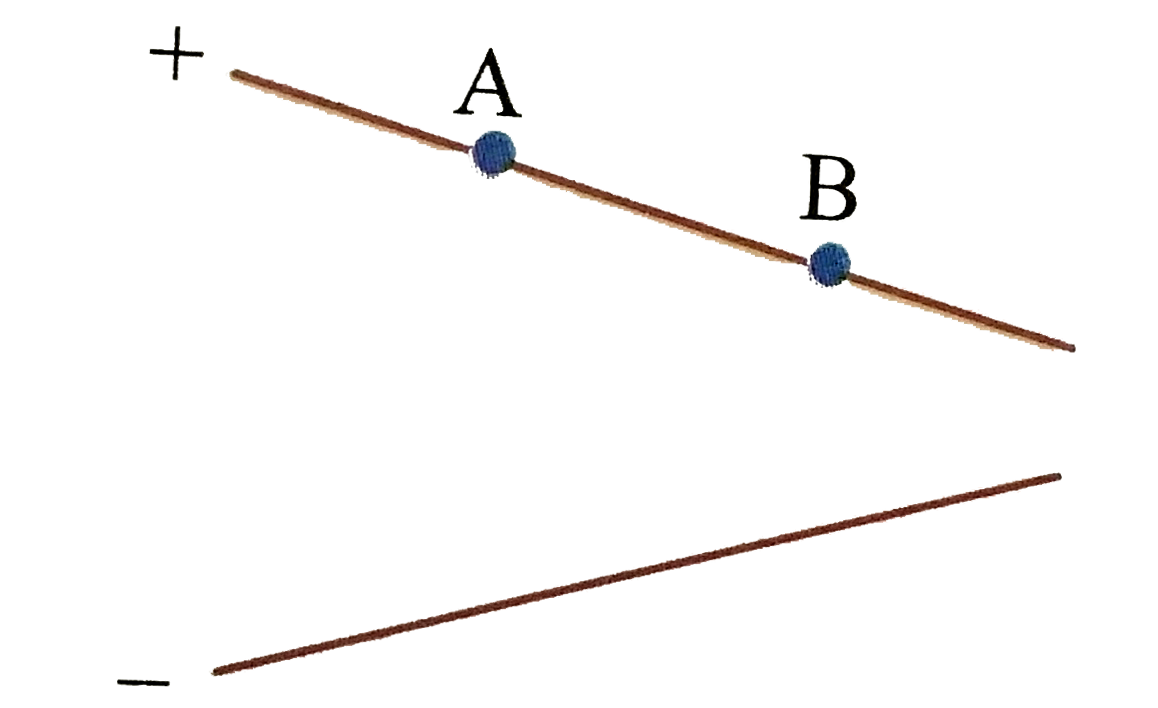(i) The plates of a capacitor, initially connected to a battery for a long time, are disconnected from it now. How is the charge on the capacitor affected?
(ii) The plates of a charged capacitor are connected to each other by a conducting wire. What happens to the charge after connection?
Video Solution
Text Solution
(i) The charges on the plates of capacitor being opposite in polarity are bound due to attraction between them. Thus, charge will remain same even if the battery is disconnected.
(ii) Now, if the plates are connected to each other by a conducting wire, the charges on the plates will transfer through the wire till the plates acquire a common potential. Thus, the capacitor will be discharged as the net charge will become zero on each plate plate after connection.
|
Topper's Solved these Questions
- ELECTROSTATIC POTENTIAL AND CAPACITANCE Book:MODERN PUBLICATIONChapter:ELECTROSTATIC POTENTIAL AND CAPACITANCE Exercise:Tough & Tricky PROBLEMS
Explore 10 Videos
- ELECTROSTATIC POTENTIAL AND CAPACITANCE Book:MODERN PUBLICATIONChapter:ELECTROSTATIC POTENTIAL AND CAPACITANCE Exercise:NCERT FILE Solved (Textbook Exercise)
Explore 11 Videos
- ELECTROSTATIC POTENTIAL AND CAPACITANCE Book:MODERN PUBLICATIONChapter:ELECTROSTATIC POTENTIAL AND CAPACITANCE Exercise:PRACTICE PROBLEMS 5
Explore 18 Videos
- ELECTROMAGNETIC WAVESBook:MODERN PUBLICATIONChapter:ELECTROMAGNETIC WAVESExercise:CHAPTER PRACTICE TEST
Explore 14 Videos
- MAGNETISM AND MATTERBook:MODERN PUBLICATIONChapter:MAGNETISM AND MATTERExercise:CHAPTER PRACTICE TEST FOR BOARD EXAMINATION
Explore 16 Videos
Similar Questions
Knowledge Check
If the two plates of the charged capacitor are connected by a wire, then
Apotential will becomes infinteBcharge will becomes infiniteCcapacitor will get dischargedDcharge will becomes double that of earlier oneAn uncharged capacitor is connected to a battery. On charging the capacitor
AAll the energy supplied is stored in the capacitorBHalf the energy supplied is stored in the capacitorCThe energy stored depends upon the capacity of the capacitor onlyDThe energy stored depends upon the time for which the capacitor is chargedThe plates of a parallel plate capacitor are charged by a battery and the battery is disconnected after the charging. Now, the plates are placed as shown in the figure. Then (plates are not parallel to each other).
 .Athe surface charge density is greater at point ABthe surface charge density is greater at point BCthe potential at points A and B is sameDthe potential at point A is greater
.Athe surface charge density is greater at point ABthe surface charge density is greater at point BCthe potential at points A and B is sameDthe potential at point A is greater
What happens to the energy stored in a capacitor if after disconnecting the battery, the plates of a charged capacitor are moved farther
View SolutionWhat happens to the energy stored in a capacitor if after disconnecting the battery, the plates of a charged capacitor are moved farther
View SolutionWhat happens to the energy stored in a capacitor if after disconnecting the battery, the plates of a charged capacitor are moved farther
View SolutionEach plate of a parallel plate capacitor has a charge q on it. The capacitor is now connected to a battery. Now,
View SolutionA capacitor is connected to a battery of 20 V, so that a charge of 100μC is obtained at the plates. The capacitance of the capacitor is
View Solution